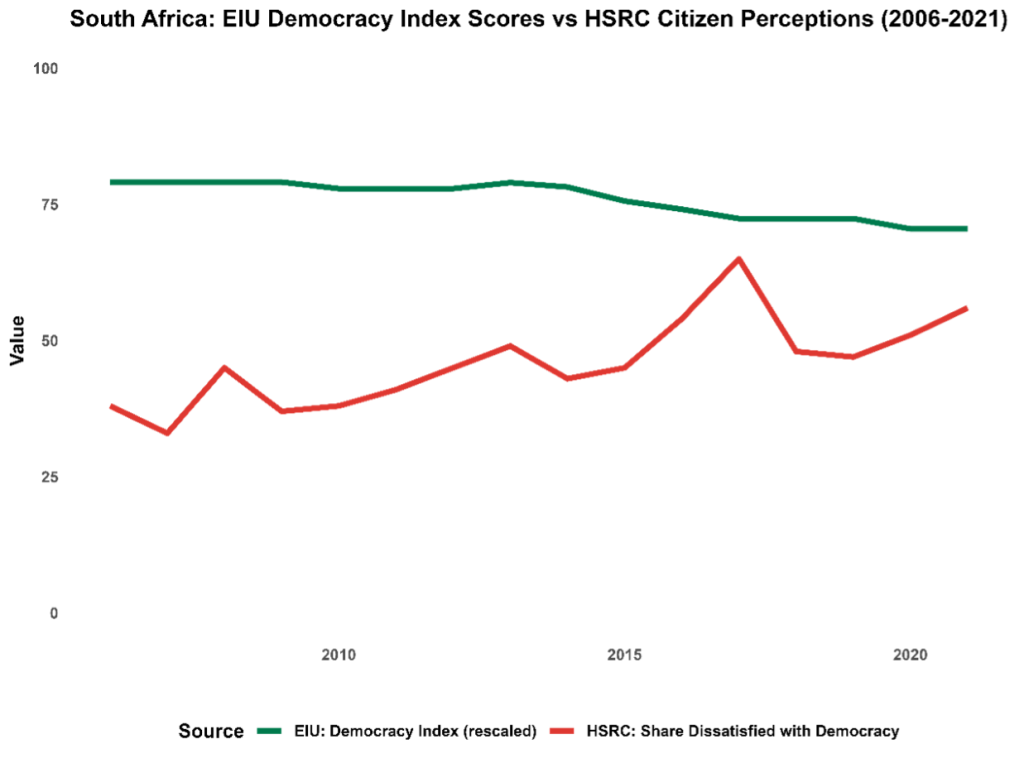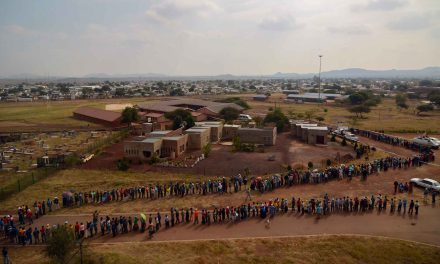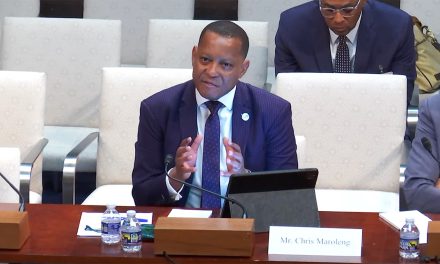A somewhat perplexing disconnect lies at the heart of South African democracy today. On the one hand, the country continues to perform relatively well, particularly within the African context, on the global indices of democratic quality and political rights which are provided by independent organisations such as The Economist Intelligence Unit’s Democracy Index and Freedom House’s Freedom in the World Index.
On the other hand, according to several recent public opinion surveys conducted by equally credible organisations such as Afrobarometer and the Human Sciences Research Council, the dissatisfaction that South African citizens express in their own democracy has spiked in recent years.
Moreover, this growing democratic discontent appears to be a latent force behind the increasing receptiveness, particularly among younger South Africans, to non-democratic and even anti-democratic political messages. The more these messages resonate with citizens, affecting elections and democratic institutions, the more plausible it is that South Africa will slide on global indices of democratic quality.
Admittedly, this crystallising sentiment forms part of a global pattern wherein the cornerstones of democratic governance, such as freedom of the press, electoral integrity, the value of independent institutions, and the separation of powers, are being questioned.
However, given South Africa’s history, finding the right balance of solutions appropriate for our context is all the more urgent. And while the responsibility for resolving this challenge may lie with broad swathes of South African society, the group that is most obliged to begin restoring public confidence in our democracy is public officials, foremost among them the president.
In fact, one could reasonably assert that for all the specific pledges that a South African president makes upon assuming office, the general promotion and preservation of the country’s democracy, and the perpetuation of our constitutional framework, are the paramount responsibilities of any custodian of that office.
It is for precisely this reason that the principal objective of Ramaphosa’s State of the Nation address on 8 February should be to make the case to every citizen that democratically accountable governance remains their best hope for improving their own material well-being. Democratic accountability does not end at the ballot box, but it begins there, and every citizen should be encouraged to both vote and participate in holding elected officials to account between elections.
The expectation is that the theme of democracy will be prevalent in the address, as many predict that Ramaphosa will devote part of it to announcing the date of the general elections. However, a mere proclamation of the election date, accompanied by the usual exhortation to exercise democratic rights, is insufficient to convince a doubtful public of the worthiness of investing in South African democracy, whether in this specific election or in the years and decades ahead.
Making this broader, far more ambitious case also requires a degree of candour atypical of a politician in a major election year.
From the outset, Ramaphosa will need to draw the somewhat ironic conclusion that revitalising the faith South Africans have in their democracy will take more than just a single speech, or a single election, but a multi-year effort driven by a capable government and an engaged citizenry.
For too long, political leaders, especially at the national and provincial levels, have suffered from selective amnesia wherein they only recall the existence of the average citizen when elections are on the horizon. Similarly, citizens need to fully leverage the many avenues available for democratic engagement between elections.
It is frequently noted, for instance, that there is dwindling citizen engagement with municipal ward committees, limited public presence in open parliamentary hearings, and negligible awareness of parliamentary constituency office hours or the provisions for public comment on legislation.
Certainly, there needs to be a concerted effort to reform aspects of our political system to better encourage participation and greater emphasis on raising civic awareness, but ensuring that such changes are effected in the first place will require greater citizen engagement in the platforms that already exist.
Beyond this, the president will also need to unpack the governance failures at the root of the current malaise and illustrate how democratically accountable governance remains the key channel for addressing these failures. Clearly, corruption and the electricity crisis emerge as significant enablers of democratic dissatisfaction in South Africa.
As the inserted graphic indicates, democratic dissatisfaction in South Africa first spiked in 2008, one year after load-shedding started. The pessimism solidified in the mid-2010s, a time when the news was awash with stories of corruption breaching the highest echelons of the government. Over the same period, the country’s Economist Intelligence Unit scores have remained generally strong, but evidently a slight, though perceptible, decline has occurred. Mainly, this is because the index category in which South Africa most underperforms is political culture, the dimension most closely related to social cohesion and consensus building.

In previous State of the Nation addresses, the president has dedicated substantial time to outlining how he seeks to address both corruption and load-shedding. This is necessary, but insufficient, for the purpose of reviving public support for, and satisfaction with, democratic governance.
In addition to outlining strategies to tackle these issues, the president needs to connect the dots between having a largely independent press, possible only in a democracy, and the exposure of high-level corruption.
It would be prudent for Ramaphosa to acknowledge that democratic dissatisfaction has been exacerbated by the apparent inability to prosecute the most powerful enablers of corruption, contributing to the perception that the powerful do not need to abide by the same rules as the broader citizenry.
In respect to identifying solutions, it is crucial for Ramaphosa to highlight how public institutions which retain credibility, such as the judiciary and the auditor general, play a key role in combating corruption precisely because of our constitutional framework.
Similarly, many of the core recommendations of the Zondo Commission demonstrate that what South Africa needs is more democratic accountability, not less.
Making a similar argument over load-shedding—as demonstrable a governance failure as any in our democratic era—is more challenging. Yet, it is worth reflecting on whether Minister of Electricity Kgosientsho Ramokgopa would feel compelled to provide regular and public updates on the crisis if South Africa were an autocracy rather than a democracy.
In the context of the energy crisis, it is also worth asking whether the incumbent government would feel as sensitive to the public mood over load-shedding if free and fair elections were the exception rather than the norm in South Africa.
To be sure, in making the case for democracy, the president need not only focus on how the public awareness of governance failures would be less obvious in an alternate system of governance. Indeed, many positive cases can be, and have been, made about how the nation has made important governance strides over 30 years of democracy.
However, by using his address to honestly reflect with the broader public on the specific governance problems which have severely dented public confidence at this point in time, the president will be demonstrating the clear value of democratically accountable governance, with an argument that stretches beyond any single election.
It will then fall on every citizen to seriously consider whether it is truly worth replacing the democracy, for which previous generations made sacrifices, with an alternative that, by its very nature, obscures the governance process from the public eye.
Nothing less than the future of the South African nation will depend on the course citizens ultimately decide to chart.
This article first appeared in Mail & Guardian.
Pranish Desai is a doctoral student in political science at the Massachusetts Institute of Technology. His core areas of focus are in comparative politics and political methodology, with a specific interest in the politics of Southern Africa. Between 2021 and 2024, Pranish held several key positions within the Governance Insights and Analytics programme at GGA. In these roles, he was centrally responsible for the elevation and enhancement of the Governance Performance Index as GGA's flagship governance assessment tool. Before departing GGA, Pranish also played a key role in the development of our strategic framework for the 2024-2028 period.







